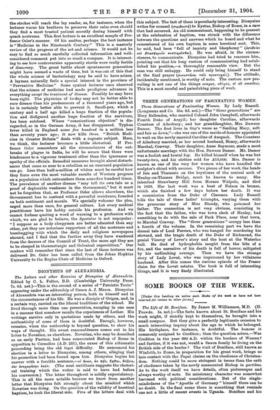The Letters and other Remains of Dionysius of Alexandria. Edited
by C. L. Feltoe, B.D. (Cambridge University Press. 7s. 6d. net.)—This is the second of a series of "Patristic Texts" appearing under the editorship of Canon A. J. Mason. Dionysius of Alexandria was an interesting person, both in himself and in the circumstances of his life. He was a disciple of Origen, and, in a certain way, carried on the liberal traditions of the school. He lived through more than one persecution, escaping in one case in a manner that somehow recalls the experiences of Luther. His writings survive only in quotations made by others, and the authenticity of some of them is doubtful. Enough, however, remains, when the authorship is beyond question, to show his ways of thought. His sweet reasonableness comes out in his letter to Novatian, as elsewhere. Novatian, who may be described as an early Puritan, had been consecrated Bishop of Rome in opposition to Cornelius (A.D. 251), the cause of this schismatic proceeding being the old lapsi difficulty. He announced his election in a letter to Dionysius, among others, alleging that his promotion had been forced upon him. Dionysius begins his answer with a forcible sentence,—si 41CWY, LIU Ctliglx0nc,Se4els, gas, iwaxcepiaps ila0511. (The neat antithesis suggests the rhetori- cal training which the writer is said to have had before his conversion.) The letter throughout is mildly expostulatory. This is all the more notable because we know from another letter that Dionysius felt strongly about the mischief which Novatian was doing. On the question of the validity of heretical baptism, he took the liberal side. Five of the letters deal with this subject. The last of these is peculiarly interesting. Dionysius writes for counsel (sseaSooxi) to Xystus, Bishop of Rome, in a case that had occurred. An old communicant, happening to be present at the celebration of baptism, was struck with the difference between the questions and answers which he heard and what he remembered of his own baptism in some heretical sect. This, he said, had been "full of impiety and blasphemy" (lareSe;as Kai BAaaoniAsZv nenAnpeo'creal). He was afraid, in the circum- stances, to communicate. Dionysius had tried to reassure him, pointing out that his long custom of communicating had estab- lished his position,—a thoroughly reasonable view. But the man was still unhappy. He could only bring himself to stand at the final prayer (auvecrTdrai rain Tpocrevxa4). The attitude, incidentally mentioned, is worthy of note. The custom now pre- vailing is not one of the things semper, ubigue, et ab omnibus. This is a most careful and painstaking piece of work.


































 Previous page
Previous page